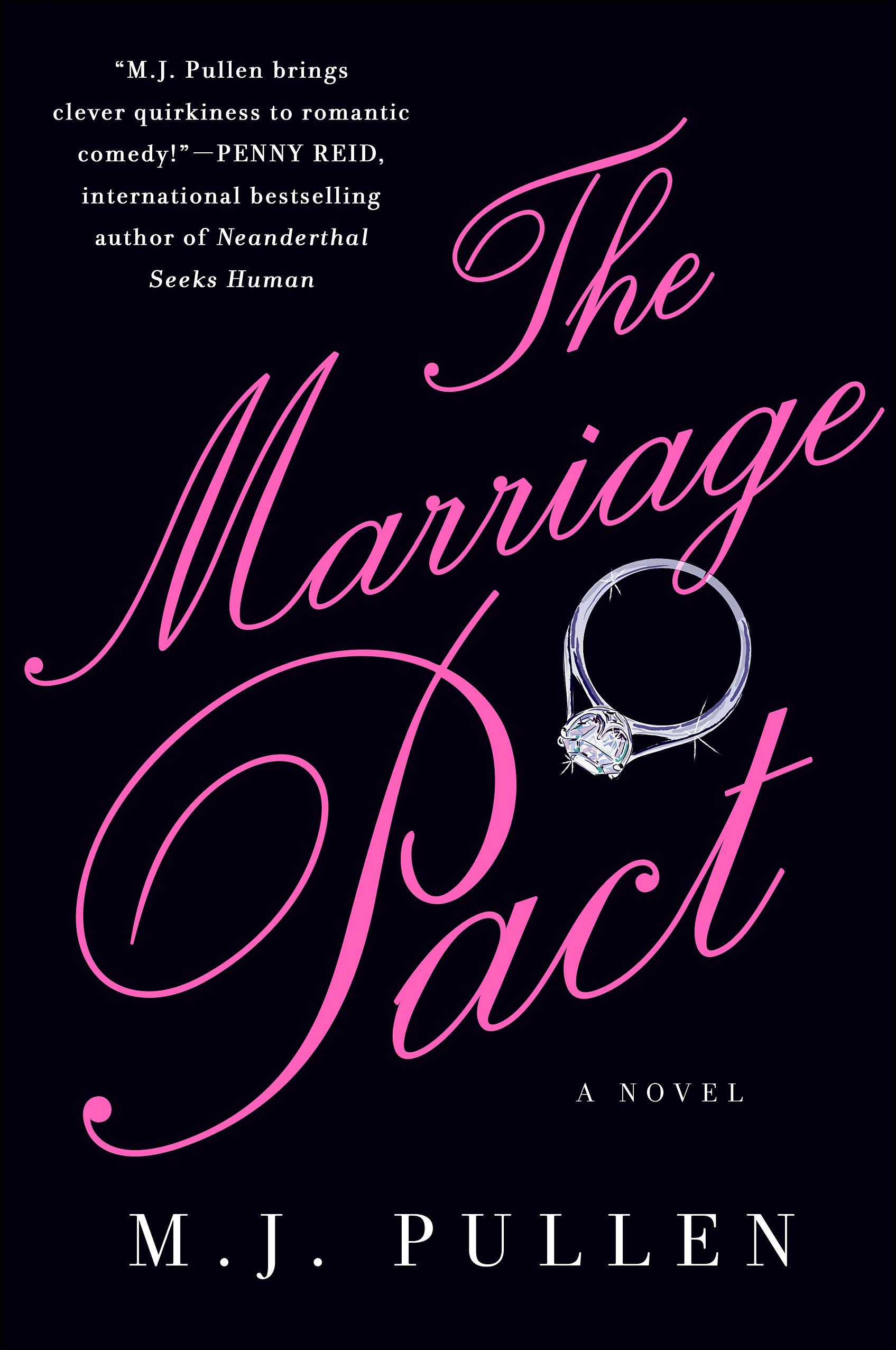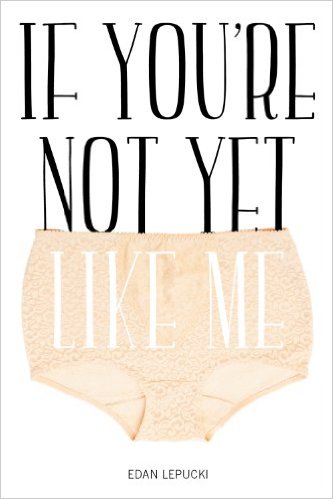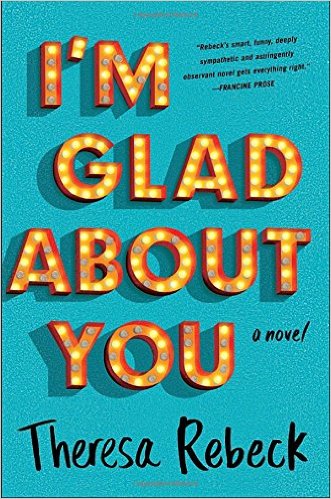"A man ought to read just as inclination leads him, for what he reads as a task will do him little good."—Samuel Johnson
| Reviews | Limericks | Six Words | Buy Nothing |
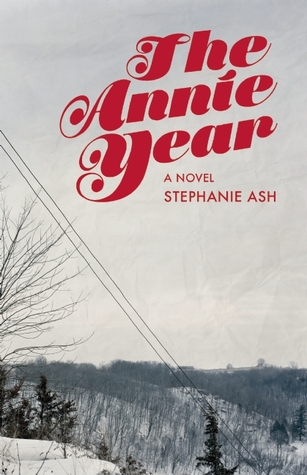 29 December 2016
29 December 2016
The Annie Year
Stephanie Wilbur Ash
It's an Annie year in this small Midwest town, meaning there's a high school girl with both spunk and a good church voice to play the lead in the musical (it's a Guys and Dolls year when the football team gets suspended for drinking). Tandy Caide, the town CPA and charter member of the pessimist's club, is a local supporter of the arts, and on opening night she meets the new Vo-Ag teacher, Kenny, who bewitches her with his beaded belt from his Peace Corps days in Benin. Tandy Caide herself has, as they say, a voice. If it leans a little too heavily on the "you people in the big cities probably don't know what life in our little town is like" (I have grown weary of the use of urban condescension, real or imagined, as justification for atrocious behavior), it more than makes up for that with Tandy's descriptions of her husband eating meatball subs in the hot tub or of her lover's ponytail and man clogs, and her obsession with Bruce Willis in a 1980s Seagram's Golden Wine Coolers commercial. There's a lot less about Little Orphan Annie in here than I expected, but the theme of motherless children runs throughout.
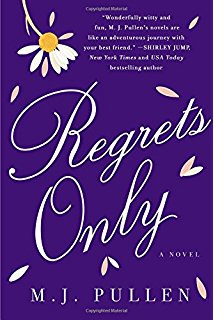
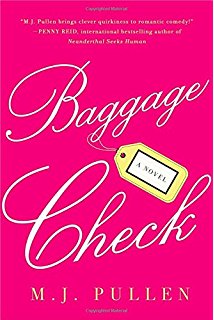 23 December 2016
23 December 2016
The Marriage Pact Trilogy
M.J. Pullen
Each book in this series focuses on a different woman in a group of friends who all went to college at the University of Georgia. The first, Marcy, is living in Austin, where neither love nor work is going as she planned, so her thirtieth birthday has her considering going through with the marriage pact she made with her friend Jake back in school. The second, Suzanne, is being courted by a famous country singer, and the third, Rebecca, returns to her home town to help her parents and reunites with a high school flame. Each character plays a part in the others' stories, and it adds depth to see secondary characters become main ones, and vice versa. I think I liked Rebecca's story the best, maybe because she was almost a villain in the other books. She's the most down to earth of the three, too (but not literally; she's a flight attendant). There is plenty of glamour and a heaping helping of Southern culture (football, clothes, makeup), but there is also a stalker, an affair with a married man, and worries about work and money. Whether we hear more about this group or about some new characters, I'm looking forward to this author's next book.
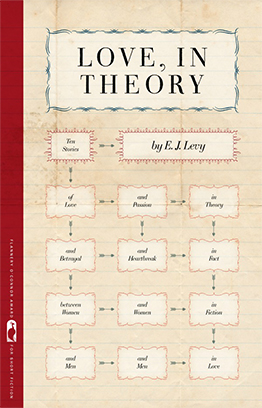 18 December 2016
18 December 2016
If You're Not Yet Like Me
Edan Lepucki and
Love, in Theory
E.J. Levy
Will there ever be enough stories about educated young white women and their dating lives? No! If You're Not Yet Like Me has an extra edginess that made me sit up and take notice. The main character is pursuing a guy, and both of them are aware he's not much of a catch, and anyway, maybe she isn't either. It's just weird enough to be interesting and still believable, and while its length qualifies it as a novella, it's as fresh, and static, as a short story. Love, in Theory is a little more predictable. The protagonists make attempts at human connection, the clumsiness of their personal interactions contrasting sharply with the elegance of the metaphors and wordplay with which they analyze these attempts. A typical story ends with the main character sitting in a bathtub, resigned to soldiering on alone through the ultimate emptiness of life. You'll love both of these books. Unless you're not yet like me.
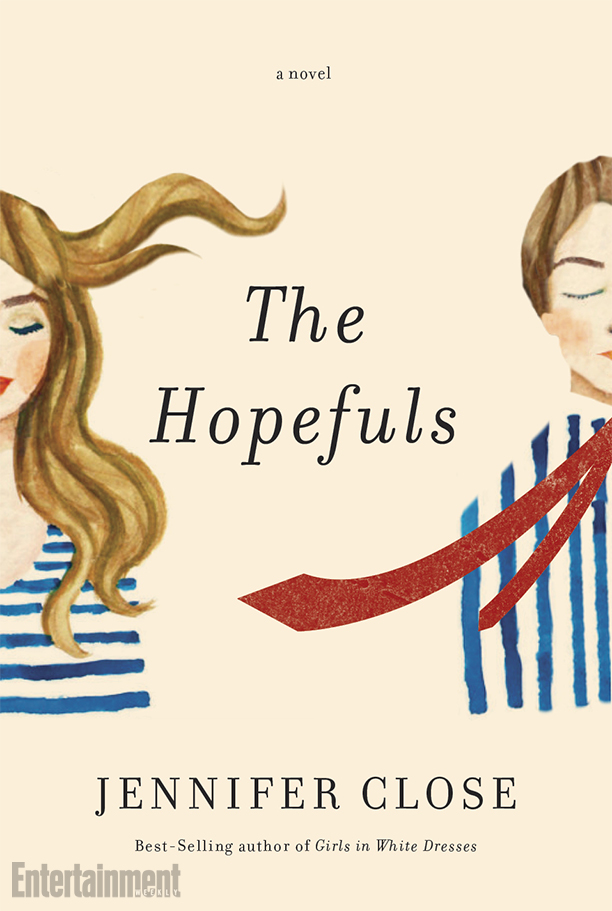 18 December 2016
18 December 2016
The Hopefuls
Jennifer Close
Beth is a transplant to Washington, D.C., having left New York City to join her husband, Matt, who is working on Barack Obama's 2012 reelection campaign. She gets a job at a D.C. lifestyle blog, and intends to be working on her own writing projects on the side, but politics begins to consume both her and her marriage. She and Matt get pulled into the orbit of another young political couple, transplanted Texans Ashleigh and Jimmy. Jimmy is a natural charmer, gifted with the natural charisma that Matt lacks, which eventually lands Matt in the role of his campaign manager. Ashleigh has her own Southern charm, which Beth, being a northerner, never quite learns to read or trust as she becomes drawn into a friendship that fills her otherwise shapeless life. I read this over the summer, when hope still seemed a thrilling part of politics. It's very good as a novel about marriage, family, and friendship, but I think it would be painful to be reading now about a time, not so long ago, when the prospect of Mitt Romney as president seemed like a terrible thing.
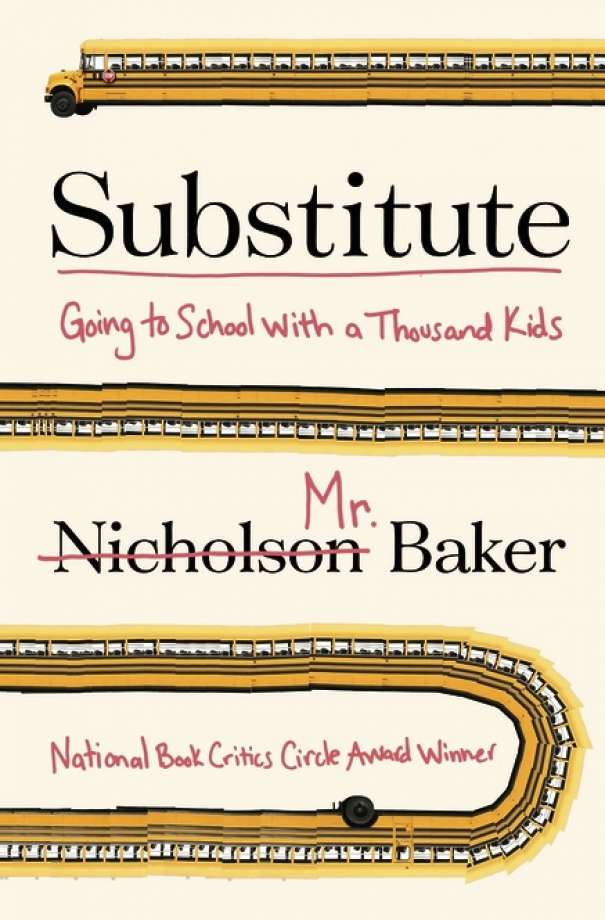 10 October 2016
10 October 2016
Substitute: Going to School With a Thousand Kids
Nicholson Baker
Baker worked for 28 days as a sub in Maine's public schools and recorded pretty much everything he saw, did, and heard each day. It amounts to over 700 pages, but he has a good ear so even the faithful transcriptions of the lunch menus are interesting. Like any sub, he spent most of his time shouting at the class to be quiet. No one thinks subbing is an easy job, but he's decided from the start that school itself is the problem. And he does identify some big problems, which have gotten much worse since I was a student*, such as the rush to employ technology without considering whether it's helpful. He watches a child who still hasn't mastered addition or subtraction struggling with an interactive perimeter problem: "The quick, cute iPad lessons were luring these third-graders out to sea in little rowboats and leaving them there to sink." Also, not only does every bit of learning have to be described in eduspeak, but it's all shared with the kids. What is an eight-year-old supposed to make of a reading objective like "I make connections text-to-text and text-to-self"? Another problem is that everyone has to go to college, even if they want to work in trades and have the aptitude and desire. As another teacher explains to Baker, you can't apprentice to an electrician or carpenter without having gone to college. Even though we're desperate for tradespeople. So school has problems. Baker's solution is that kids should get private one-on-one tutoring at taxpayer expense, rather than having to come to school, which is just providing free child care for their working parents (as if that's a bad thing). He also decides, because some children on medication seem fine, that therefore they don't need the medication (?). Of course, logic and analysis have never been his strong suits as a writer. At least Baker isn't one of those subs who thinks he can come in and show the veteran teachers how it's done. In fact, he doesn't seem to want to do much actual teaching at all. You would think he could have been more useful in an 8th grade literature class: "'I guess you're thinking about conflict today? Conflict in short stories?' I said I didn't understand what conflict was, and why we needed to look for it...I had nothing to offer them." Okay, great, thanks, Mr. Winner of a National Book Critics Circle Award. If his purpose in being in these classrooms was to be a passive observer in order to collect material for this book, then he did his job. But he was being paid to substitute teach.
*I don't remember teachers swearing or snacking in front of the students, both of which Baker does frequently and which no one seems to think anything of. Apparently students of all ages have snack breaks in class now, which shouldn't surprise me, as it's now impossible for more than two people to be together for more than 30 minutes without a snack being required.
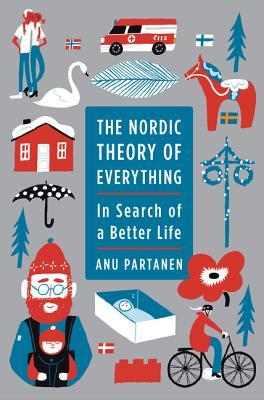 1 August 2016
1 August 2016
The Nordic Theory of Everything: In Search of a Better Life
Anu Partanen
I was expecting a travelogue like The Almost Nearly Perfect People, but this is not so much a book about the Nordic countries as it is a book about America. Finnish journalist Partanen moves to the US and is overwhelmed by the complicated meanness of modern American life. Enormous amounts of time and energy are spent finding (and paying for) decent education for children, finding (and paying for) huge college loans, finding or providing (and paying for) care for elderly parents, and of course, finding (and paying heavily for) health care: taking, and keeping, a job you hate so you have it, living in fear of losing it, and—even with insurance—navigating a complicated bureaucracy (often while sick!) and getting hit with huge bills. When she is cut off from Finnish health care after her move she is shocked to have to personally deal with the nightmare of finding insurance that every American faces. Being American, my first thought was "How could she not have considered whether she'd lose her health benefits?" But of course, to a Finn, the phrase "lose your health benefits" doesn't even make sense. Everyone has guaranteed health care. Partanen presents the theory that the Nordic countries have figured out that letting the state take care of the necessities in life frees people to form family and work relationships based on desires and skills rather than on needing to be taken care of by employers, family, partners, or charity. It's about individualism and self-interest, not "socialism", and it's why that region leads the world in quality of life. It's a powerful argument. Here and there she vaguely mentions how glad she is to be in the US (and not just because of the relationship she moved for), but given that Finland has plenty of freedom and democracy, and doesn't have the constant stress of worrying that one misstep on some form will render you destitute, it's hard to see why one would prefer to be here. The weather? I guess we likely have a wider variety of restaurants than Finland does. It's probably easier to find a good zydeco band. The thing is, it's not a zero sum game. We could restructure our health care and education system and still have the cultural and geographic diversity that makes America special. How much longer do we have to suffer?
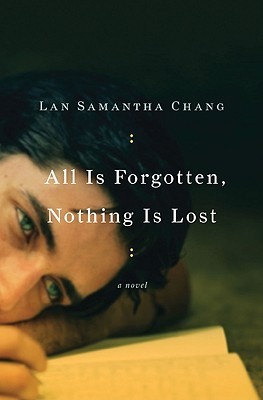 1 August 2016
1 August 2016
All Is Forgotten, Nothing Is Lost
Lan Samantha Chang
This sad little novel reminded me of Stoner, as it describes the arc of a male academic's career and its rewards and disappointments (and those of his family life and friendships as well). In this case the main character is a less reliable lens through which to view his own life, able to perceive slights to himself but not the ways he fails others. This book is set in the late, rather than mid-, twentieth century, so the golden age of academia is rapidly tarnishing, and economic struggles are increasingly a reality, but the internet has not yet become an influence. The beauty of Chang's writing gets the reader through this book, just like the power of literature sustains its characters, as the world it describes is pretty bleak. This is a slim but strong selection on the campus novel shelf.
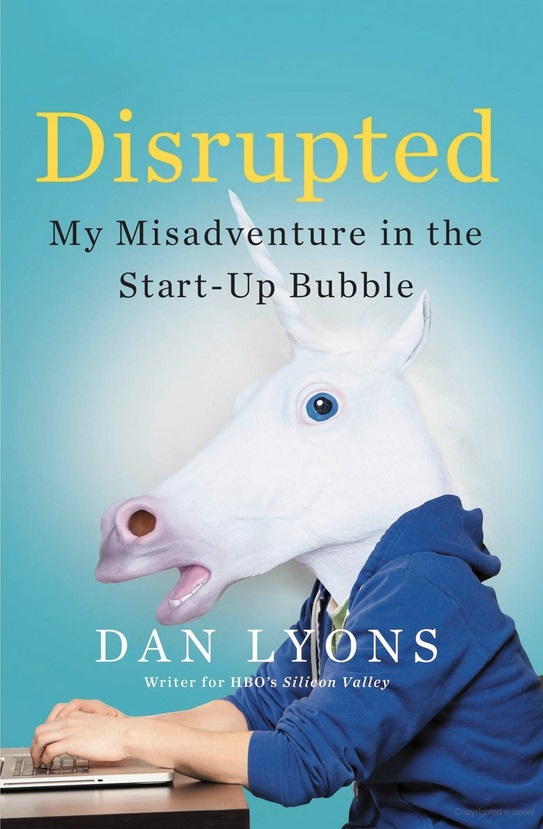 10 June 2016
10 June 2016
Disrupted: My Misadventure in the Start-Up Bubble
Dan Lyons
After losing his job as a technology reporter for Newsweek, longtime journalist Lyons decides to try to cash in on the startup madness and become a "marketing fellow" for the marketing software company HubSpot. Beneath the cultlike babble about the awesome software and the amazing colleagues, he finds that the software is so bad that the company doesn't even use its own product, and employees are treated as expendables to be squeezed until they quit, or get fired without warning, and are replaced with someone cheaper and more desperate. Job insecurity is pitched as freedom, and foosball tables and free candy distract from poor compensation (trends that are spreading throughout the whole labor world). Unlimited vacation isn't such a great deal when you realize that it allows a company to fire you without paying you earned time. It's a world that doesn't make sense: a startup can be considered successful and make investors rich without ever making a profit, and people who've never sold anything can write books on how to be marketing "rock stars." At some point, however, I started to wonder if Lyons' entire problem lay with HubSpot. He makes it clear that he believes that his coworkers' youth is sufficient reason not to respect them, and is repeatedly unable to stop himself from insulting them on Facebook. He is also very good at understanding the subtleties of age discrimination, which he experiences at HubSpot, and explains how a company seeking employees who "fit in" won't end up with a diverse workforce. Yet he compares a colleague to a hectoring wife, and thinks a writer's room full of guys making jokes about giant horse c**ks and dry v****as is an ideal work environment. By the end of the book I was as eager to get away from Dan Lyons as he was to get out of HubSpot. Still, he's a lively writer, and if nonsense jargon makes you crazy and the words "team-building exercise" make you want to hide in the bathroom, you'll enjoy this. You'll also be very afraid of the new world of work.
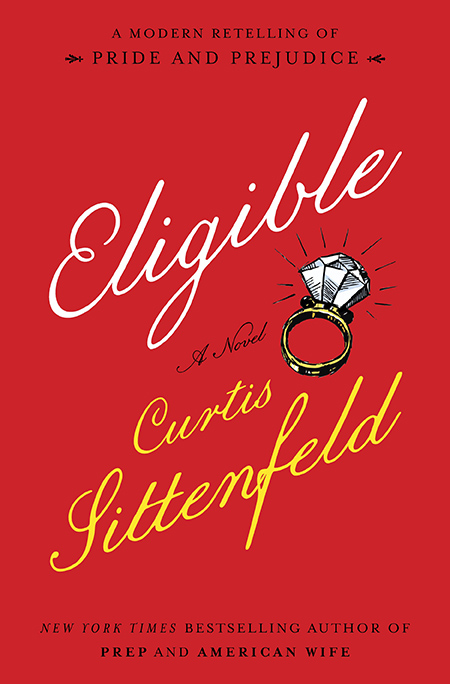 2 May 2016
2 May 2016
I'm Glad About You
Theresa Rebeck and
Eligible
Curtis Sittenfeld
Here are two novels about women who leave their lives and their work in New York City to pay extended visits to their families in Cincinnati and deal with difficult men there. I'm not going to try to compare Sittenfeld's modern retelling of Pride and Prejudice to the original, as it has been decades since I read the latter, and a book needs to stand on its own anyway. I will say that I don't recall P&P having so many less-than-one-page chapters. All books should have such short chapters as Eligible; they're like little M&Ms to eat one by one in bed before turning out the light.
Rebeck's book has less of a plot, but it is, I assume, wholly original to her. The best parts of her book are the look at the life of a television actress, something I haven't found too often in contemporary fiction. The worst parts were the digs at feminism (even as she adroitly depicts a menacing sexual encounter) and the incessant references to the Midwest as provincial compared to sophisticated New York. Sittenfeld stands up for her hometown of Cincinnati, but as usual with her writing (including her awkwardly self-conscious inclusion of non-white and, in this case, transgender, characters) I can never tell to what degree she is mocking herself. Her novel is the more polished of the two, but she also had a big assist from Austen. In any case, I can think of many things of which one would sooner tire than either of these books.
More Sittenfeld: Sisterland
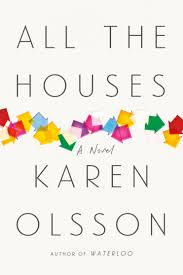 24 February 2016
24 February 2016
All the Houses
Karen Olsson
Your interest in this novel might depend upon how well you can relate to the protagonist, Helen, a thirty-something woman whose L.A. screenwriting career isn't taking off as hoped and who moves back in with her father in Washington, D.C., after he has a heart attack. It will also help to have more than a passing interest in the Iran-Contra scandal, which brought down her father's career 25 years earlier and about which Helen wants to collaborate with him on a book. Her move is supposed to be temporary, but for lack of any better ideas she stays on, taking a temp job, hooking up with her sister's high-school boyfriend, moving into her own apartment in a sketchy neighborhood, and getting tangled up with the teenaged girl next door. The novel cruises along in first gear for the duration, but Olsson avoids the predictable and deftly portrays the bonds of intimacy and irritation in families. She's also great at painting a picture of Washington, D.C., or at least of the government players in the northwest suburbs—the Washington part of a place so starkly two cities, as she says, that it has two names. Helen has poor judgment, but she means well, and what can I say? I have a weakness for a woman whose jokes fall flat and who forgets to wear a belt.
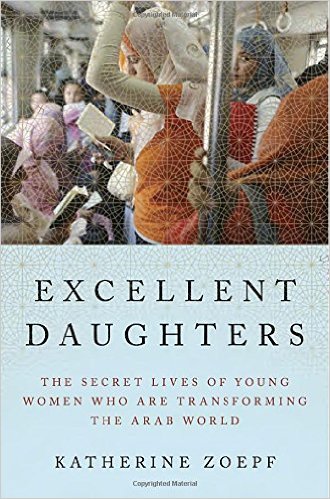 5 February 2016
5 February 2016
Excellent Daughters: The Secret Lives of the Young Women Who are Transforming the Arab World
Katherine Zoepf
This is an indeed excellent exploration of the cloistered yet surprising lives of women in the Arab world today. Zoepf, a reporter in her twenties, was raised by a Jehovah's Witness, so in some ways she feels more kinship with the rigidly religious Arab girls she interviews than with her secular American peers. Their sharply sex-segregated society allows teenaged girls little freedom, but it can also bring the opportunity to develop close female friendships and abundant confidence (after all, as Zoepf writes, these are girls who told from birth that the sound of their voices or a glimpse of their hair will drive men mad with desire). It also seems it is not uncommon for girls to disguise themselves as boys and sneak out of the house for a taste of life in the world. Marriage often means even greater isolation, but in one of the many seeming paradoxes this book illuminates, an early marriage can sometimes offer a woman increased freedom, if her husband is less conservative than her family. Most of the young women portrayed strongly defend Islam, and even restrictions like needing permission from a male guardian to go anywhere, as good for women. Horrors like honor killings are often attributed to Islam, but they are in fact legacies of a tribal culture than many Muslims believe Islam opposes. The region is struggling with the clash of modernity and tribalism; some say the changes in the Arab world since the oil boom of 50 years ago are equivalent to the changes in Europe since the Middle Ages, such that within one household illiterate grandparents and educated grandchildren see each other as something like alien time-travelers. Young Arab women are increasingly part of the changes, traveling to the Gulf to work as flight attendants, which opens up to them a new world of work based on western values of merit and performance rather than nepotism and corruption. Zoepf places these young women's stories in a historical and political context, and tells them with insight and affection.
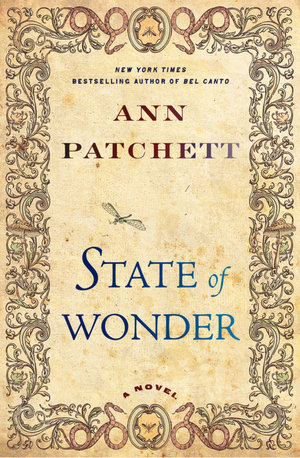 5 February 2016
5 February 2016
State of Wonder
Ann Patchett
I'm glad I can add this to the short-but-longer-than-it-should-be list of books I tried once and didn't get into, but gave a second shot and loved. I'm also very glad that in the five years since the book came out I have forgotten the ending that Michael Feldman gave away when he interviewed Patchett (much to her deserved annoyance). A novel about fertility and the Amazon rainforest is about the last thing I thought I would be interested in, but it's got everything that makes a book great: strong characters; vivid descriptions; interpersonal complexities; perfect pacing; and mysteries unpeeled layer by layer. I decided to give it a second look when I read, in Big Magic, Elizabeth Gilbert basically taking credit for Patchett's book, the nucleus of which she believes was transmitted from her to Patchett when they kissed each other on the lips several years ago. Okay, so truth really is stranger than fiction, but this book is certainly strange and wonderful.
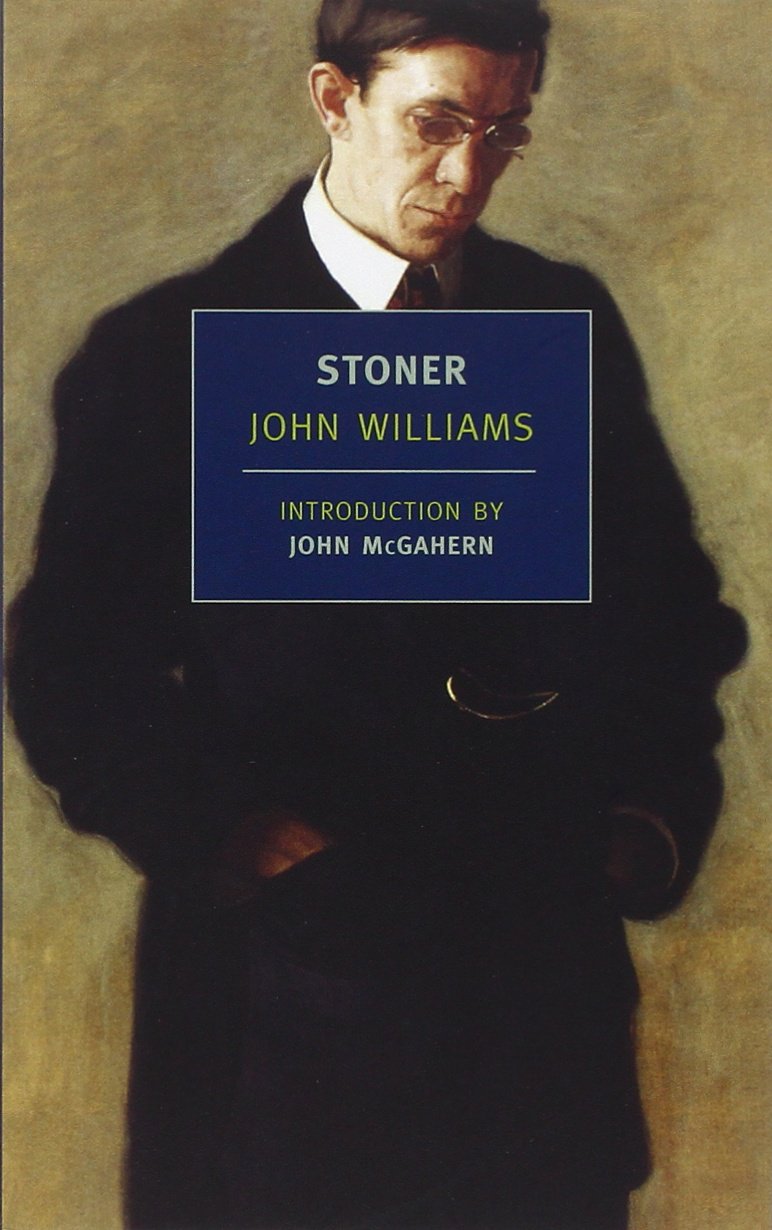 21 January 2016
21 January 2016
Stoner
John Williams
I'm so pleased to have found yet another decades-old book by an author I'd never heard of, and enjoyed it immensely! This one didn't sell well when it came out, but it was critically appreciated and recent reissuing has garnered it well-deserved attention. William Stoner, born to poor farmers in Missouri, is sent to college, falls in love with literature, and becomes a professor. His disappointing marriage and a nasty ongoing feud with a fellow professor take their toll, but his work sustains him. Set mainly in the 1930s and written in the early 1960s, its characters seem resigned to the restrictions of their lives. Williams conveys in equal measure the dignity of duty, the beauty of long relationships with colleagues and with work, and the sadness of wasted potential. It belongs alongside the work of Sloan Wilson, Richard Yates, and Evan S. Connell.
"There was so much to read, for one thing, and so much fine health to be pulled down out of the young breathgiving air...I was rather literary in college—one year I wrote a series of very solemn and obvious editorials for the Yale News—and now I was going to bring back all such things into my life and become again that most limited of all specialists, the 'well-rounded man.' This isn't just an epigram—life is much more successfully looked at from a single window, after all."—F. Scott Fitzgerald, The Great Gatsby
Copyright © 1996–2026 So Much to Read
Contact: books at so much to read dot com
